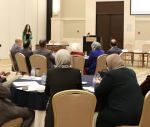You are here
Priorities for Egyptians
May 28,2014 - Last updated at May 28,2014
Egyptians have confused and confounded their rulers by failing to turn out as expected in this week’s presidential election, the second since the toppling of president Hosni Mubarak, who had ruled for 30 years, in 2011.
Many did not vote because the landslide victory of former army chief Abdel Fattah Al Sisi was assured.
His rival leftist Hamdeen Sabahi, who fought an energetic campaign, knew this from the outset, but sought to position himself as the leader of the opposition after the election.
Some did not like either candidate and others observed the Muslim Brotherhood boycott.
The election was disappointing for both men. Voting had to be extended by a third day to boost the number of voters.
Sisi had asked 40 million Egyptians, four-fifths of the electorate, to cast ballots, while Sabahi had hoped for a respectable percentage of the total.
The failure to achieve these objectives deprives the election of legitimacy and the new president of the popular mandate he sought to secure a strong hand for dealing with Egypt’s post-uprising, post-Brotherhood rule challenges, which are security and the economy.
Egypt is facing a security meltdown at home and on its borders.
On the domestic front, the security forces are trying to suppress a simmering Brotherhood revolt to protest the ouster of Mohamed Morsi, the movement stalwart elected to the presidency in 2012 and toppled last summer by the military after popular protests against his rule.
The state also faces a rising insurgency mounted by radical jihadists, based in lawless Northern Sinai. They are taking advantage of the insecurity caused by the Brotherhood’s campaign against the government to carry out terrorist attacks on the army, police and public institutions.
Foreign jihadists joined this struggle, crossing into Egypt from Libya and elsewhere. More than 1,000 people have died since Morsi’s fall and some 500 police and soldiers were killed in the jihadist offensive.
To make matters worse, weapons of war have flooded Egypt from unstable Libya and Sudan.
Sisi was projected as the figure who can not only deal with the security situation but also impose law and order on a country where crime and corruption have been rampant for many years.
Egypt faces destabilising forces on all its borders.
To the west, Libya is caught up in a civil conflict. To the south lie Sudan, suffering from a political power struggle, and South Sudan, where rival militias are fighting for dominance.
To the east is war-torn Somalia and to the north Israeli-controlled and blockaded Gaza, ruled by Hamas, an offshoot of the Egyptian Brotherhood.
Due to mismanagement during the Mubarak era, the economy has faltered and failed since 2011 because of a lack of political stability and of effective policies to initiate reform.
Inflation stands at 12 per cent, but the cost of fruit and vegetables has risen by 25 per cent over the past year, putting a burden on every family.
Egypt’s growth rate is 1.25-1.5 per cent, but the population is growing by 2.6 per cent a year. The economy cannot keep up with the babies. Unemployment stands at 14 per cent, but is 24 per cent among the youth.
Tourism, once a major foreign exchange earner, has fallen to $5.8 billion from $12.5 billion in 2010. Egyptians who depend on tourism for their livelihood are desperate.
During the first day of voting, I visited polling stations in the depressed slum neighbourhood near the great pyramids at Giza where guides, camels and horses stand idle in rubbish and rubble strewn unpaved streets.
Several people commanded me to write that Egypt is safe and welcomes tourists.
International investment has fallen to $2 billion from $12 billion. Domestic debt is $236 billion and foreign debt $45 billion.
The budget deficit is 13 per cent of GDP while foreign currency reserves have been reduced from $35 billion to $17 billion, not enough to sustain ongoing expenditure on essential imports of fuel and food.
The situation could have been catastrophic if $13 billion had not been provided by Saudi Arabia and the United Arab Emirates. Another $7 billion is promised for 2014-15, but Cairo has to provide proof that it is preparing reforms before the money is paid.
Sisi speaks of a “Marshall Plan”, which he expects to be financed by Saudi Arabia and the Gulf countries. The plan provides expanding Egypt’s area of habitation from the traditional 6-7 per cent of land along the Nile River and in the Delta, creating new agricultural land, building a million houses, providing jobs and encouraging investment.
He also seeks to ration subsidies on food and fuel without cutting them, at the expense of the poor, who account for 40 per cent of Egypt’s population of 90 million.
However, Sisi will have to contend with resistance from monopolies that keep prices of commodities high, wealthy businessmen who wield considerable influence, and the military, which has a large economic empire, including factories, tourist resorts and petrol stations.
A weak mandate from the people will make the task of economic reform and rationing all the more difficult.
The slogan of the 2011 Egyptian uprising was: “Bread, freedom and social justice.”
Because of the threats posed by insecurity and terrorism, Egyptians have postponed the demand for freedom, but insist on bread and yearn for social justice.
Sisi has a limited time to provide bread and must create a horizon for the achievement of some social justice.
He has suggested that he will improve the livelihoods of Egyptians, 40 per cent of whom live below the poverty level, within two years. He cannot afford to fail in this near-impossible task.













